Wrong number: To get help with rent, applicants struggle with confusing, complex processes
A billion-dollar rental assistance effort that has struggled at times to get enough applicants listed incorrect phone numbers, for months, that people could call for more information on the program in two North Carolina counties.
Even some of the correct phone numbers on the state-run referral website, which promises information for local programs in communities across North Carolina, ring to automated menus for county services, presenting callers with an array of unrelated government services instead of clear information on the federally funded pandemic Emergency Rental Assistance program.
And, in at least one case, the referral page linked not directly to an online application for these grants, but to a county web page where applicants needed to find another link to a press release on the program, then another link in the release to the actual application.
The N.C. Office of Recovery and Resiliency, which oversees the referral site and the overall effort to help people pay rent in a pandemic, quickly fixed these issues after WRAL News pointed them out. But internet archives show phone numbers for rental assistance programs in Wake and Union counties had been wrong at least since May.
It’s impossible to say how many people, if any, were sidetracked, but people are clearly finding the program. Wake County said this week that its call center struggled to keep up with volume in recent months and that it’s working to process nearly 3,000 applications now.
Asked for its biggest challenges, a spokesperson for Union County’s program said it’s had trouble getting required documents from tenants and landlords despite multiple follow up requests.
“We give the (tenant) applicants 10 days to respond and provide 3-4 calls and emails,” spokeswoman Liz Cooper said in an email. “Landlords may take 2 weeks to get us needed information.”
Program complex, layered
This Emergency Rental Assistance program is a complicated animal.
It’s run by state and local governments, though some Republicans, including North Carolina Congressman Patrick McHenry, point fingers at President Joe Biden’s administration for an “absolute failure to administer” a program that started slow, partly because local officials waited on federal spending rules. It has also been slow to distribute money, nationally and in North Carolina, for a variety of reasons, including delays in getting required information from landlords and tenants.
Funded by Congress to the tune of $1.2 billion in North Carolina alone, ERA is meant to keep renters in their homes by covering back rent and unpaid utility bills for people below a certain income threshold. Twelve local programs in the state’s largest counties and five for North Carolina’s various Indian tribes got their own funding from the federal government, and they run their own operations.
Gov. Roy Cooper’s administration, through the N.C. Office of Recovery and Resiliency, then runs a version for people living in the state’s other 88 counties. NCORR also serves as a clearinghouse of information on the smaller programs, and the office’s “Find Your Program” web page directs people where they need to apply based on where they live, listing local program phone numbers and websites.
Until WRAL News called attention to these issues Friday that website:
- Gave the main number for Wake County Health and Human Services instead of the direct line to Raleigh and Wake County’s joint rental assistance program. The number NCORR provided rings to a recorded menu that offers people, among other things, a chance to enroll in Medicaid, to report child abuse and to learn about adoption programs. There’s no mention of ERA.
- Gave the main number for Union County government offices, which rings to a recording offering a list of departments. The first option is public works, followed by planning, then the register of deeds. There’s no mention, even two menus deep, of the ERA program, which has had its own dedicated number in the county for months.
- Gave the correct number for Cumberland County’s program, but linked to a Cumberland County webpage with no obvious link to the ERA application. That had to be accessed by clicking on a press release. Inside that press release was another link to the application page.
“Periodically checked”
NCORR spokeswoman Bridget Munger said the “Find Your Program” page is “reviewed and periodically checked,” but that “information may change without web staff knowing right away.”
She also said most of the contact information came from the local programs themselves. WRAL News did not probe whether local programs asked for changes, but internet archive searches show that both Union County and the joint Wake/Raleigh program were listing direct lines to their call centers on their own program webpages going back to at least May.
Though state and local officials say a number of issues have slowed the programs down, Cooper has repeatedly called for more people to apply, and advocates say one of the roadblocks has been getting word to people who need the program. WRAL News essentially ran a reverse telethon last month to spread the word.
Interest seemed to pick up as an expected July 31 end of the national eviction moratorium approached, though that moratorium was extended in early August to last until October 3.
To boost its numbers, the state changed income thresholds in June, saying renters could make 80 percent of their area’s median income instead of 50 percent. At the beginning of August the program started encouraging landlords to refer tenants, and it also increased monthly award limits on rent by 30 percent.
So far the state’s version of the program, called Housing Opportunities and Prevention of Evictions or “HOPE,” has sent out about $140 million of the $389 million it has to spend. That total number has moved around some: It started at $546.6 million but the state sent $157 million of that down to the local programs, roughly doubling their part in the effort.
Munger said the state's HOPE program has gotten 67,742 applications this year, and that the state call center averaged 4,696 calls a day in July.
Another $556 million in ERA funding is expected, from American Rescue Plan funding approved in March. The state also ran a similar, but smaller, HOPE program last fall before Congress approved the money now involved.
At that call center, representatives are trained not just on the state program, but to tell applicants how to reach out – online and via telephone – to local programs if they live in a county that has one. Munger said those call center employees work off the state’s “Find Your Program,” meaning they likely gave bad numbers for Wake and Union counties.
Call center workers have since been given updated numbers, Munger said.
Concerns in Wake, but volume bigger issue
Wake and Raleigh’s joint Emergency Rental Assistance program is run by Telamon, a non-profit that connects people to government services. The company’s housing director said he couldn’t guess how the state listing the wrong number affected call volume, though calls have been steady the last two months.
“Then again, I don’t have anything to compare that to,” Telamon Housing Director Brandon Bell said, calling the discrepancy “something that concerns me.”
The Wake County program has had 6,871 applicants so far and approved 1,777 of them, according to county spokeswoman Leah Holdren. Another 2,874 are in process, she said.
The biggest challenge right now, Holdren said, is the influx of applications.
“Between May and June, applications increased by 60 percent, and July saw an increase of 11 percent on top of that,” she said in an email.
Lots of menus, holds
Not every county and city have a dedicated line for their program, so even correct numbers on the state website often ring at local social service offices with automated answering menus.
Sometimes there’s an option for the ERA program, some times people are simply asked to hold or leave a message if they’re calling about something not included in the main menu. That's the case in Guilford County, for example.
Legal Aid of North Carolina, a non-profit that takes calls from the public, said it has heard complaints from people who don't understand how to apply for rental assistance and say they can't get through to someone. But a spokesman couldn't immediately say which programs callers targeted the most, or whether the complaints typically boiled down to long hold times.
Most applications are likely made online, not over the phone, though, and the state-provided links to application sites, with the exception of Cumberland County’s, appeared to be accurate when WRAL News tried them Friday.
It's also important that the sites be mobile friendly, and Munger said that the state's is. Testing that for the local programs would require creating accounts in the various systems, but initial probes by WRAL News seemed to indicate that at least most opening screens render well on a cell phone.
Bell, with Wake County's program, said most people apply using a smart phone.
“Very few people are applying on a computer,” he said.












